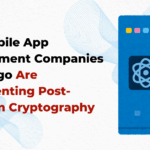
In the rapidly changing realm of mobile application development, a significant focus for app developers is the enhancement of offline functionality. As mobile applications increasingly become integral to users’ daily routines, the expectation for uninterrupted experiences—regardless of internet connectivity—continues to rise dramatically. App Developers in Europe are recognizing the importance of designing applications that can operate effectively without a continuous internet connection. This trend is transforming user interactions with their devices and fostering innovation within the sector. For individuals in areas with unreliable or limited internet access, as well as those who are frequently on the move, applications that support offline functionality present a considerable advantage.
Consequently, the incorporation of offline features is emerging as a vital element for the success of mobile applications. This article will examine the escalating significance of offline functionality in mobile apps, the strategies European developers are employing to meet this demand, and the necessity for businesses to select the most suitable software development company for the creation of such applications.
Why Offline Functionality Is Important
The ability for an app to function offline isn’t just a nice-to-have feature anymore—it’s a necessity. Here’s why:
1. Enhanced User Experience
One of the key reasons for the importance of offline functionality is its significant enhancement of user experience. Applications that operate without the need for a continuous internet connection offer users seamless services. This feature is particularly beneficial for individuals residing in rural areas, regions with inadequate network coverage, or those traveling. A pertinent example is navigation applications such as Google Maps, which have long permitted users to download maps for offline access, thereby enabling navigation even in situations of poor connectivity. For businesses seeking to develop such features, partnering with a Mobile App Development Company in the UK can help ensure the integration of offline functionality that meets user needs and provides a competitive edge in today’s app market.
2. Increased Accessibility
The availability of offline functionality broadens the accessibility of applications to a wider audience. Despite the ongoing expansion of 5G networks, many users still encounter slow or unreliable internet connections. For businesses seeking to engage with global markets, particularly in areas with limited infrastructure, offline capabilities ensure that their applications remain functional for all users, regardless of the strength of their network.
3. Faster Load Times
Applications that depend heavily on internet connectivity may suffer from prolonged load times, especially during periods of network congestion. Conversely, offline applications can operate at significantly higher speeds since they do not depend on network performance to retrieve data. This leads to faster user interactions and an overall enhancement in user satisfaction.
4. Lower Data Usage
For users mindful of their data consumption or those with restricted data plans, offline functionality can prove to be transformative. By enabling applications to store data and content for offline access, users can reap the benefits of an application without incurring substantial data charges.
5. Reliability in Emergency Situations
In emergencies, where network connections may be absent or unreliable, applications equipped with offline functionality become essential tools. For example, healthcare, emergency services, and public safety applications must possess offline capabilities to guarantee access to critical information during urgent circumstances, irrespective of network availability.
How App Developers in Europe Are Addressing the Demand for Offline Functionality
App developers in Europe are acutely aware of the increasing demand for offline capabilities and have swiftly adjusted their development methodologies accordingly. They are integrating a diverse array of technologies and strategies to prioritize offline functionality within their applications.
1. Local Data Storage Solutions
A prevalent technique for facilitating offline capabilities involves local data storage. European app developers are employing mobile storage solutions, such as SQLite databases or IndexedDB, to retain application data directly on the device. This enables users to access information, content, and features without the necessity of an active internet connection.
2. Caching and Background Syncing
Another tactic utilized to enhance offline functionality is caching. By storing essential data and content, applications can present saved information even when users are not connected to the internet. Furthermore, background synchronization methods allow applications to automatically update data once an internet connection is restored, ensuring that the app remains current without requiring manual intervention from the user.
3. Progressive Web Apps (PWAs)
Progressive Web Apps (PWAs) represent a modern category of web-based applications that provide offline functionality while delivering a native app experience. These applications utilize service workers to cache data and deliver content offline. European app developers are increasingly adopting PWAs to create applications that function effectively in both online and offline settings.
4. Offline-first Development Approach
A significant number of app developers in Europe are now embracing the offline-first strategy. This methodology ensures that applications are designed primarily for offline use before incorporating online features. By emphasizing offline functionality, developers can ensure that their applications provide seamless and uninterrupted experiences, irrespective of the user’s internet connectivity.
5. Integration of Cloud Services
To achieve a balance between offline and online functionalities, cloud services are frequently integrated with mobile applications. Cloud synchronization guarantees that once users regain internet access, their application data is updated across all devices. This hybrid approach enables European app developers to deliver a comprehensive user experience.
Benefits for Businesses Choosing the Best Software Development Company
For businesses, choosing the best software development company to implement offline functionality in their mobile apps can result in significant benefits. Here’s why:
1. Competitive Advantage
In a competitive landscape where users are presented with numerous application options, the inclusion of offline functionality can distinguish your app from others. Companies that emphasize offline capabilities are likely to foster user trust and loyalty. Additionally, businesses that serve areas with inadequate network infrastructure can access previously neglected markets, thus broadening their customer reach.
2. Future-Proofing Your App
As reliance on mobile applications continues to rise, the need for offline features is expected to increase. Collaborating with a leading software development company to integrate offline functionality can help businesses ensure their applications remain relevant and functional in the future.
3. Improved User Retention
The presence of offline capabilities is crucial for user retention. When an app can be utilized without an internet connection, users are more inclined to return and engage with it consistently. This not only enhances user interaction but also contributes to the long-term success of the business.
4. Reduced Development Costs in the Long Term
While the initial investment in offline functionality may seem significant, it can yield substantial savings over time. By providing a more dependable app experience, minimizing the frequency of updates caused by connectivity issues, and enhancing user satisfaction, businesses may experience lower customer support expenses and reduced app maintenance needs.
5. Building Trust with Users
Applications that operate offline cultivate user trust, as individuals can depend on the app’s performance without connectivity concerns. This trust often results in improved app ratings, favorable reviews, and increased word-of-mouth referrals—essential components for any business seeking to grow.
Challenges for App Developers in Europe in Implementing Offline Functionality
While offline functionality offers numerous advantages, it also comes with its own set of challenges. App Developers in Europe face the following hurdles when integrating offline capabilities into mobile applications:
1. Data Storage Limitations
Mobile devices possess limited storage capacity, which poses challenges in accommodating substantial amounts of data for offline usage. App Development Companies in Qatar must optimize data storage to guarantee that users have sufficient space on their devices for the app’s offline functionalities without overburdening the system.
2. Complex Syncing Mechanisms
A significant challenge associated with offline functionality is the implementation of effective synchronization mechanisms. Maintaining data consistency between the online and offline versions of the application necessitates meticulous planning and development. Developers in Europe must create systems capable of addressing data conflicts and managing updates in real-time once the device reconnects to the internet.
3. Security Concerns
The issue of offline data storage also introduces security risks. The retention of sensitive user information on the device can render it vulnerable to unauthorized access in the event of a security breach. Therefore, app developers must incorporate stringent security measures, such as encryption, to safeguard offline data.
4. User Expectations
Once offline functionality is established, users may anticipate seamless performance even in environments with poor network connectivity. This can elevate user expectations and place additional pressure on developers to enhance offline features continuously, resulting in increased demands for quality assurance and ongoing maintenance.
Conclusion
As mobile app users continue to expect seamless, uninterrupted experiences, offline functionality is becoming increasingly important. App Developers in Europe are rising to the challenge by integrating sophisticated solutions such as local storage, background syncing, PWAs, and cloud-based technologies to ensure apps remain functional without a stable internet connection. For businesses, partnering with the best software development company to prioritize offline features can be a game-changer in today’s competitive market. By offering offline capabilities, businesses can improve user retention, reach underserved markets, and future-proof their apps, all while building trust and enhancing the overall user experience.





0 Comments